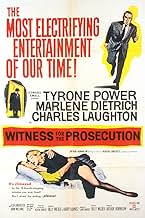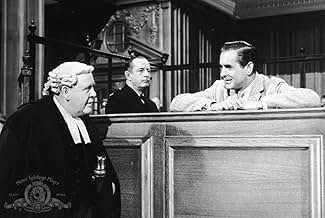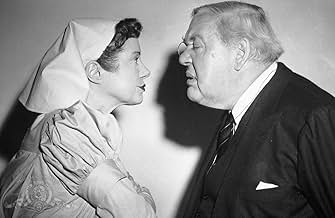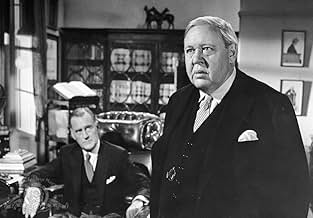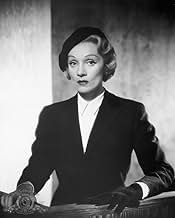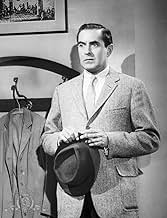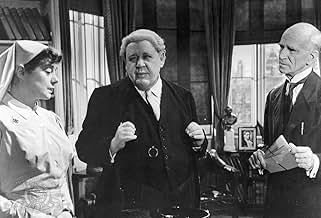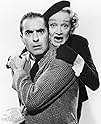Un avvocato britannico navigato deve difendere il suo cliente in un processo per omicidio che rivela una sorpresa dopo l'altra.Un avvocato britannico navigato deve difendere il suo cliente in un processo per omicidio che rivela una sorpresa dopo l'altra.Un avvocato britannico navigato deve difendere il suo cliente in un processo per omicidio che rivela una sorpresa dopo l'altra.
- Regia
- Sceneggiatura
- Star
- Candidato a 6 Oscar
- 3 vittorie e 15 candidature totali
Patrick Aherne
- Court Officer
- (non citato nei titoli originali)
Don Ames
- Bar Patron
- (non citato nei titoli originali)
Larry Arnold
- Courtroom Spectator
- (non citato nei titoli originali)
Walter Bacon
- Bar Patron
- (non citato nei titoli originali)
Eddie Baker
- Courtroom Spectator
- (non citato nei titoli originali)
Riepilogo
Reviewers say 'Witness for the Prosecution' is celebrated for its intricate plot, masterful direction by Billy Wilder, and standout performances by Charles Laughton and Marlene Dietrich. The film delves into themes of justice, deception, and complex human relationships within a gripping courtroom drama. Its twisty narrative and surprising ending are often praised for enhancing suspense and entertainment. Despite minor critiques on pacing and some performances, the overall reception is highly positive, marking it as a genre classic.
Recensioni in evidenza
At the end of the day the films you give top marks are those films that become constant companions. You can see them again at the drop of a hat, you show them to people who have never see them and it's always a triumph. "Witness For The Prosecution" is one of those wonders. Suspend your disbelief for a couple of hours and enjoy this banquet of a romp. Charles Laughton showed here what he was made of better, more clearly and more loudly than in any other film and all of his films, at least the moments with him in it, are unforgettable - Captain Blight or Henry VIII, Quasimodo or that malefic Senator from South Carolina. Here the severity of his lawyer by vocation takes your senses away with his masterful judicial way to see logic and it's such an incredible fun to watch him do it. Tyrone Power is a toy in his hands but not Marlene Dietrich who stands her ground, not merely as a character but as a presence on the screen. Billy Wilder visits early Hitchcock territory with wit and fun. Elsa Lanchester's nurse is the cherry on top of this delightful film.
This is one of the best "trial movies" ever made. It's an outstanding film that is just as good today as it was almost 50 years ago when it was released in the theaters. The shocking ending caused quite a stir back then, too.
The only part of the movie I thought looked dated and unrealistic was Tyrone Power's character being able to interrupt the trial with outbursts and not be reprimanded for it. There is no way that would be tolerated, at least today.
Otherwise, it's a pretty solid film with a good cast that includes two fascinating characters played by actors who know how to entertain: Charles Laughton and Marlene Dietrich.
Laughton, who plays Power's defense attorney, grabs the spotlight in the story but Dietrich almost steals the movie in her role as Power's wife. Laughton's dialog is terrific throughout, bringing a number of laughs to this serious film. He's just a joy to watch. Dietrich is even more riveting but just doesn't have anywhere near the same amount of screen time as Laughton.
Not to be overlooked is Elsa Lanchester, playing Laughton's nurse. She, too, demonstrates her comedic talent and significantly adds to the fun of watching this film.
If you like some fine drama, storyline twists, a little humor thrown in and great acting and dialog, this is a classic film to check out.
The only part of the movie I thought looked dated and unrealistic was Tyrone Power's character being able to interrupt the trial with outbursts and not be reprimanded for it. There is no way that would be tolerated, at least today.
Otherwise, it's a pretty solid film with a good cast that includes two fascinating characters played by actors who know how to entertain: Charles Laughton and Marlene Dietrich.
Laughton, who plays Power's defense attorney, grabs the spotlight in the story but Dietrich almost steals the movie in her role as Power's wife. Laughton's dialog is terrific throughout, bringing a number of laughs to this serious film. He's just a joy to watch. Dietrich is even more riveting but just doesn't have anywhere near the same amount of screen time as Laughton.
Not to be overlooked is Elsa Lanchester, playing Laughton's nurse. She, too, demonstrates her comedic talent and significantly adds to the fun of watching this film.
If you like some fine drama, storyline twists, a little humor thrown in and great acting and dialog, this is a classic film to check out.
Witness for the Prosecution is one of the most entertaining courtroom stories of all time, written by the crime mistress herself, Agatha Christie. Charles Laughton completely owns the courtroom, starring as a famously brilliant barrister who's supposed to be taking a break for his health-but he gets drawn in by a truly compelling murder trial. Tyrone Power, in his last movie, has been accused of murdering a wealthy older woman. While all the evidence racks up against him, Charles doesn't give up hope and tries to win the case, all the while trying to crack the very hard nut Marlene Dietrich. Marlene is Tyrone's wife, and it's impossible to tell what she's really thinking or feeling.
I love this story, and I love both versions of the film, from 1957 and 1982. It's incredibly suspenseful and interesting-and also quite impossible to talk about without giving spoilers. If you've never seen Witness for the Prosecution, add this one to your list of classics to rent. The acting is fantastic, and the timing makes it a very entertaining old movie to watch. There are no boring bits in this drama; and I guarantee you'll still sit on the edge of your seat the second time you watch it.
I love this story, and I love both versions of the film, from 1957 and 1982. It's incredibly suspenseful and interesting-and also quite impossible to talk about without giving spoilers. If you've never seen Witness for the Prosecution, add this one to your list of classics to rent. The acting is fantastic, and the timing makes it a very entertaining old movie to watch. There are no boring bits in this drama; and I guarantee you'll still sit on the edge of your seat the second time you watch it.
To see "Witness for the Prosecution" for the first time in 2008 is a jolting surprise. Nobody could do it better than Billy Wilder did in 1957. A man accused of murder, Tyrone Power, the weakest link in this terrific chain. Sir Wilfred is called to defend him, he is played by the extraordinary Charles Laughton, but he's just out of hospital - he wasn't dismissed he was expelled - and due to doctor's orders he's not to take any criminal cases. He finds Power charming and personable enough but he's not going to risk his life to save his until Marlene Dietrich makes her entrance - and what an entrance! How marvelous that what amounts to a bit of Agatha Christie's usual fare becomes such an entertaining and at times right down riveting piece of film-making.
In a recent biography of Billy Wilder, Agatha Christie is quoted as saying that this was the best adaption of her work ever done on the screen. I can't praise Witness for the Prosecution any higher than that.
Tyrone Power in his farewell film plays Leonard Vole who befriends a dotty old widow played by Norma Varden. She even rewrites her will leaving him the bulk of a very large estate. When she's murdered, Scotland Yard arrests Power.
Power's solicitor Henry Daniell retains a dream team for defense of John Williams and the recently recovered Charles Laughton. Laughton is recovering from a heart attack and against medical advice plunges into the case. Laughton also has to deal with the efforts of his assigned nurse Elsa Lanchester to keep him following doctor's advice.
The original play this was taken from concentrated completely on the Power character and the machinations of his wife. Wilder built up the character of the nurse and barrister Sir Wilfred Robards so that they almost equaled the screen time of Mr. and Mrs. Vole. So much so that Charles Laughton was nominated for an Academy Award in 1957, but lost to Alec Guinness.
Marlene Dietrich plays Mrs. Vole. She's a war bride over from Germany and she's got her own agenda going. Her performance and what her character does is the key to the whole film. Dietrich probably would have gotten an Oscar nomination herself, but due to the fact that if her performance was hyped up for Academy consideration, the element of surprise would have been lost in the film. Wilder in fact apologized to Marlene for that.
The Anglo-Saxon legal system's goal is justice. Justice is served though not quite in the way it usually is in Witness for the Prosecution.
Tyrone Power in his farewell film plays Leonard Vole who befriends a dotty old widow played by Norma Varden. She even rewrites her will leaving him the bulk of a very large estate. When she's murdered, Scotland Yard arrests Power.
Power's solicitor Henry Daniell retains a dream team for defense of John Williams and the recently recovered Charles Laughton. Laughton is recovering from a heart attack and against medical advice plunges into the case. Laughton also has to deal with the efforts of his assigned nurse Elsa Lanchester to keep him following doctor's advice.
The original play this was taken from concentrated completely on the Power character and the machinations of his wife. Wilder built up the character of the nurse and barrister Sir Wilfred Robards so that they almost equaled the screen time of Mr. and Mrs. Vole. So much so that Charles Laughton was nominated for an Academy Award in 1957, but lost to Alec Guinness.
Marlene Dietrich plays Mrs. Vole. She's a war bride over from Germany and she's got her own agenda going. Her performance and what her character does is the key to the whole film. Dietrich probably would have gotten an Oscar nomination herself, but due to the fact that if her performance was hyped up for Academy consideration, the element of surprise would have been lost in the film. Wilder in fact apologized to Marlene for that.
The Anglo-Saxon legal system's goal is justice. Justice is served though not quite in the way it usually is in Witness for the Prosecution.
Lo sapevi?
- QuizCharles Laughton, who could be moody and difficult, was apparently a dream to work with, throwing himself into the role with dedication and delight. Billy Wilder later recalled a day that was set aside just for shooting reaction shots of the jury and courtroom crowd (composed of extras hired only for the day). Normally, the assistant director would read the actors' lines, and the extras would react. However, Laughton, who was fascinated with the whole process of filmmaking, begged to help. So he came in on his day off and read all of the off-camera speeches to the jury members. He not only read his part but also the judge's, the prosecutor's, and even Marlene Dietrich's. According to biographer Maurice Zolotow in his book "Billy Wilder in Hollywood", "it was an exhibition of craftsmanship such as Wilder had never seen. He believes that Charles Laughton had the greatest technical range and power of any actor, man or woman, whom he has known."
- Blooper(at around 9 mins) Inside his chamber, Sir Wilfrid lights his cigar, and Leonard Vole locks the door to make sure that Miss Plimsoll can't enter the room and catch him smoking. Later (at around 15 mins), Wilfrid leaves his chamber without first unlocking the door.
Actually, Vole does not lock the door, but puts the keyhole cover in place to stop Plimsoll spying through the keyhole.
- Citazioni
Sir Wilfrid: I am constantly surprised that women's hats do not provoke more murders.
- Curiosità sui creditiAs the end credits appear on screen, an announcer's voice is heard: "The management of this theater suggests that for the greater entertainment of your friends who have not yet seen the picture you will not divulge to anyone the secret of the ending of Witness for the Prosecution."
- ConnessioniFeatured in Marlene (1984)
- Colonne sonoreI May Never Go Home Anymore
Music by Ralph Arthur Roberts
Lyrics by Jack Brooks
Sung by Marlene Dietrich (uncredited)
Reprised a cappella by Tyrone Power (uncredited)
I più visti
Accedi per valutare e creare un elenco di titoli salvati per ottenere consigli personalizzati
Dettagli
- Data di uscita
- Paese di origine
- Lingue
- Celebre anche come
- Testigo de cargo
- Luoghi delle riprese
- Azienda produttrice
- Vedi altri crediti dell’azienda su IMDbPro
Botteghino
- Budget
- 3.000.000 USD (previsto)
- Lordo in tutto il mondo
- 7903 USD
- Tempo di esecuzione1 ora 56 minuti
- Colore
- Proporzioni
- 1.66 : 1
Contribuisci a questa pagina
Suggerisci una modifica o aggiungi i contenuti mancanti


![Guarda Trailer [OV]](https://m.media-amazon.com/images/M/MV5BNTM2MjYzMjAtZjI5MC00YTI1LWI2MzAtMWFlNDc2OTU1MTRiXkEyXkFqcGdeQXRyYW5zY29kZS13b3JrZmxvdw@@._V1_QL75_UX500_CR0)
